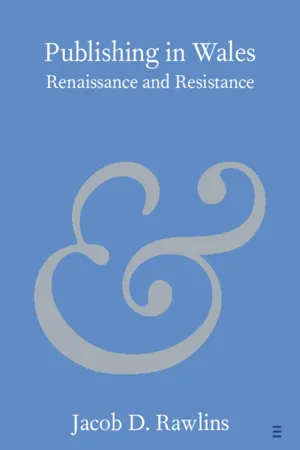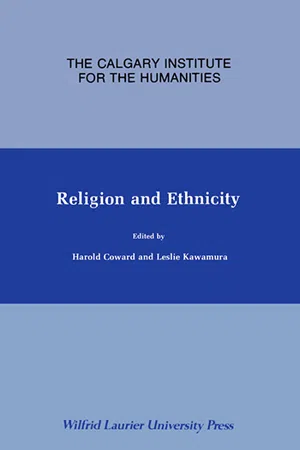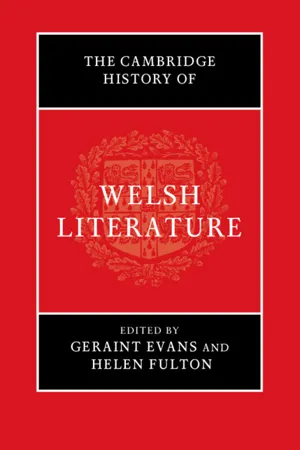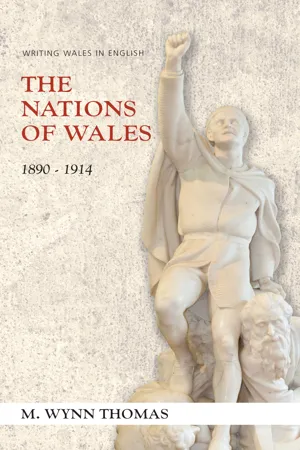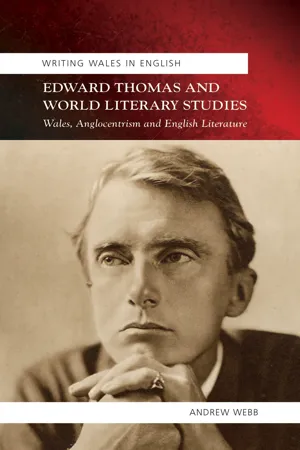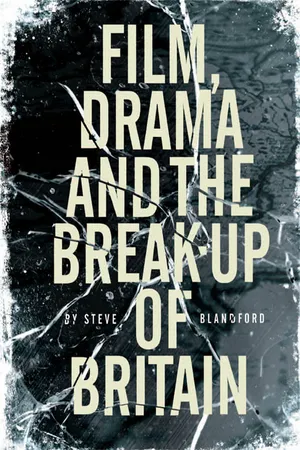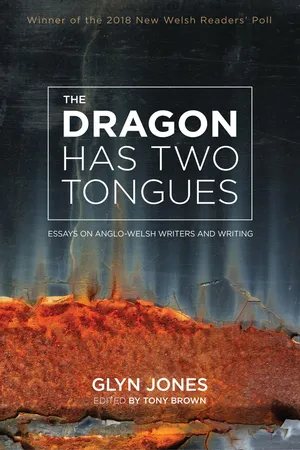Literature
Welsh Literature
Welsh literature refers to the literary works produced in Wales or by Welsh writers. It encompasses a rich tradition of poetry, prose, and drama in both Welsh and English languages. From the medieval poetry of Taliesin to the modern works of Dylan Thomas and contemporary authors, Welsh literature reflects the cultural, historical, and linguistic diversity of Wales.
Written by Perlego with AI-assistance
Related key terms
1 of 5
7 Key excerpts on "Welsh Literature"
- eBook - PDF
Publishing in Wales
Renaissance and Resistance
- Jacob D. Rawlins(Author)
- 2022(Publication Date)
- Cambridge University Press(Publisher)
While working with a much smaller data set is difficult, it also allows for more individual stories to be told. Each book, after all, is the culmination of the work of the author and all the people associated with printing the book. Throughout this Element, I include some of these individual stories and focus on some of the important publications in Wales and the people who produced them. These individual stories, as distant descendants of the rich Welsh story- telling tradition, help create a broad overview of Welsh publishing history. Publishing in Wales 5 2 Welsh History and Identity If, therefore, they would be inseparable, they would become insuperable. —Gerald of Wales 2 Modern Wales is a small nation of idyllic landscapes, resort towns, and agriculture that also bears the scars of industrialization and the postindus- trial economic slump. Wales is bounded on the west by the Irish Sea and on the east by Offa’s Dyke, and its hills are dotted with crumbling Norman castles, great manor houses, quarries, and mines. The Welsh landscape tells part of the story of this nation and its resilient people, who are often forgotten or subsumed into their membership in the United Kingdom. But the rest of the story is told in the books of Wales. As “one of the oldest continuous literary traditions in Europe” (Evans and Fulton, 2019: i), the books of Wales establish and maintain the unique Welsh identity. Welsh people are distinct, culturally and linguistically – the proud descendants of ancient Celts who have survived waves of migration and invasion by Romans, Anglo-Saxons, Vikings, and Normans, and have preserved their identity through history, poetry, song, and story. There could be many approaches to a brief historical overview of Wales, but in this Element, I focus on three aspects of Welsh identity: (1) the existence of Wales as a separate nation, (2) the independence of the Welsh religion, and (3) the endurance of the Welsh language. - eBook - PDF
- Leslie Kawamura, Harold Coward(Authors)
- 2006(Publication Date)
- Wilfrid Laurier University Press(Publisher)
Since awareness of the legacy of the past seems to be an important ingredient in nationality, the nation's history, myths, legends, epics will acquire almost the status of a heilsgeschiehte. Strangely enough there has been comparatively little historical reference in the literary tradition of Wales. 3 The emergence of national consciousness came from a new interest in tradition, history, music and literature in the eighteenth century; in the following century it was expressed in terms of non-conformist radicalism, and in the present century largely in cultural institutions. The modern era has produced its hero figures, Cyril Williams /Religion and Welsh Nationality 153 and also its poets with a fervent appeal to patriotism. One of the most radical, Gwenallt, has emphasized the responsibility that goes hand in hand with privilege, and his poetry has exercised considerable influence. To understand the contemporary scene it is necessary, however briefly, to recall some events of significance in the nation's journey. Who are the Welsh? The Welsh are descendants of an Indo-European group designated the Celtae by classical authors. By the Christian era one branch of the Celts called the Brythoniaid (Britons) had settled in different parts of the British Isles including Wales. Towards the end of the Roman occupa-tion, at the time of the early Anglo-Saxon settlement, one form of the British language became recognisable as Welsh. 4 It was spoken in parts of Scotland, in parts of England as well as in Wales itself. By the eighth century, it was a written language and in basics not very differ-ent from modern Welsh. Not without justification then has it been call-ed by Professor Tolkien the Senior language of British civilization. 5 The term Welsh is an Anglo-Saxon word derived from Wealh meaning a foreigner in general. It survives in the word walnut, which meant literally a foreign nut. - eBook - PDF
- Geraint Evans, Helen Fulton(Authors)
- 2019(Publication Date)
- Cambridge University Press(Publisher)
21 The problem of finding a Welsh readership remained too. Despite the relatively stable history of Welsh-language publishing in Wales, one might argue that authors in Welsh as well as English in Wales face difficulties in finding readers. In a 1995 essay entitled ‘Writing on the Edge of Catastrophe’, Welsh-language author Wiliam Owen Roberts declared, ‘The population of Wales i[s] about 2,500,000. Out of this, about 400,000 to 500,000 speak Welsh. This includes everyone and as a writer that’s my entire possible audience. The percentage of people who actually read literature in Welsh must be anyone’s guess.’ 22 Ned Thomas has argued that the situation for anglophone Welsh writers is comparatively worse. Discounting for a moment the possible world- wide audience for Welsh writing in English, he argues: ‘In theory [in Wales] there are half a million Welsh speakers and three million English speakers . . . So there should be six times the audience [for anglophone Welsh writing], but all the evidence is that there isn’t six times the audience, indeed there isn’t sometimes half the audience for a book in English in Wales that there is for a book in Welsh.’ 23 lisa sheppard 600 In recent decades the way in which Welsh writing in English, particularly prose fiction, has been produced has undergone a significant change. For Knight, by the turn of the twenty-first century, even more important than the increasing number of Welsh authors writing in English is the fact that the majority of this body of literature is being published in Wales. 24 Since its establishment, the Welsh Arts Council, and more recently, Literature Wales and the Welsh Books Council, have subsidized individual authors, presses, and literary periodicals. - eBook - ePub
The Nations of Wales
1890-1914
- M. Wynn Thomas(Author)
- 2016(Publication Date)
- University of Wales Press(Publisher)
4 L ITERATURE AND THE POLITICAL NATION In ‘Salutatory’, the editorial that welcomed readers to the very first issue of Young Wales, the periodical pledged itself to emphasise ‘the absolute necessity of establishing a union between the literary and the political forces of our country’. 1 True to the nineteenth-century belief in the centrality of culture to national identity, the Cymru Fydd movement attempted indefatigably to present an image of the ‘Celt’ (see chapter 5) as naturally sensitive to the finer products of the human spirit embodied, as influential Victorian sages from Thomas Carlyle to Matthew Arnold had powerfully argued, in great works of literature. And in showcasing the antiquity of Welsh Literature, advocates constantly contrasted the refined taste of a nation of chapel-loving poets with that of its politically powerful neighbour. In England, a debased, commercialised popular culture supposedly pandered to the appetites of a population brutalised by industrialisation, addicted to gambling and horse racing, and living a low life punctuated by divorce and murder. Welsh connoisseurs of culture were also liable to view a literature primly free of any hint of sensational or licentious subject matter as a welcome barrier against the new, worryingly unruly working class nurtured in the raw, raucous coalfield society of the south of the country. And just as politics sought validation from literary culture, so literature found itself attracted from time to time by political events and political personalities. A number of texts therefore appeared – including Hunangofiant Dafydd Dafis, as we have seen – that attempted to record important aspects of the dynamic, and frequently highly dramatic, political life of the day. These may be regarded as literature’s distinctive contribution to the work of educating the public in an awareness of the emergence of Wales as a newly politicised nation - eBook - ePub
Edward Thomas and World Literary Studies
Wales, Anglocentrism and English Literature
- Andrew Webb(Author)
- 2013(Publication Date)
- University of Wales Press(Publisher)
Welsh Library Series, published in London by J. M. Dent.Welsh Literature, therefore, was precariously positioned in the economic field. Its historical status inhibited the development of a publishing industry, as well as the development of institutions that would support its own literature. The language divide and urban-rural population spread caused by British industrial policy further complicated the issue of a national literature. Moreover, the transport system made quick and efficient national distribution extremely difficult, and eventually opened different Welsh regions to domination by journalistic and literary institutions based in England, all of which were structurally more advantaged than their Welsh neighbours in terms of the proximity of large readerships, effective distribution networks, the single-language market, and the availability of advertisers. While the institutions of an Anglocentric British literary space were clearly established, those of a comparable Welsh space were either non-existent or in their infancy. Moreover, they faced considerable disadvantages as a result of the industrial, linguistic and demographic changes wrought by colonialism, and the ‘free’ market in which they were made to operate.Welsh writers of the time must be seen in this context of the huge imbalance in the relative status of the British and Welsh literary fields. In particular, the historical constrictions placed on the development of Welsh literary space mean that there should be a place in modern Welsh literary history for those who pursued their writing career in London, while any decision to cross back over the national border and contribute to a Welsh literary journal or paper might be seen as a significant statement of national allegiance. The critic should remain sensitive to these economic conditions, and make it possible for a writer, past or present, who pursues a career outside of Welsh geographical space to be recovered for the literary history of the nation. Before considering if, and how Thomas, can be related to a Welsh literary space thus positioned in the economic field, attention needs next to be paid to the position of Welsh Literature in the political field. - eBook - PDF
- steve Blandford(Author)
- 2007(Publication Date)
- Intellect Books(Publisher)
Lisa Lewis’s piece, for example, seeks to distance most Welsh-language performance in particular from mainstream British theatrical tradition: … performance in Wales can easily be defined as something other than a set of devices and techniques for staging or presenting plays (that is, a vehicle for the exposition of dramatic 9 literature). Performance may include poetry, quotation and stories, including the sophisticated poetic and musical forms that lie at the centre of Welsh-language performance culture. Performance may include techniques found in forms such as the noson lawen (of sketches and sing-alongs), twpathau (barn dances), eisteddfodau (cultural events on a local or national scale incorporating all kinds of performances), and the oratory and singing taught at chapel and school. Behind these performances lies a drive that is at the core of Welsh language identity and the way that it is constructed and performed. (2004: 167) Whilst Ceri Sherlock asserts that: Wales is a performative culture and increasingly its perception is as such, as the land of song, sport and language/words – in recitation, sporting prowess, choral singing, poetry, preaching, oratory, cerdd dant , rock concerts, dance, acting, singing, painting, creating installations, erecting public art, making theatre and in all manner of creative public assemblies. (2004: 152) It is, therefore, possible to see that questions of national identity, as expressed through live performance in Wales, are debates about the value of building-based theatrical traditions to the new nation. Conversely these commentators argue in favour of the far greater relevance and applicability of diverse performance traditions that are more firmly rooted in what is a distinctive national culture. - eBook - PDF
The Dragon Has Two Tongues
Essays on Anglo-Welsh Writers and Writing
- Glyn Jones, Tony Brown(Authors)
- 2001(Publication Date)
- University of Wales Press(Publisher)
The Anglo-Welsh have produced in this century, among a large number of other poets, Dylan Thomas, R. S. Thomas, Vernon Watkins, Alun Lewis, David Jones. The Welsh have produced during about the same period, again among others, Iorwerth Peate, Euros Bowen, Caradog Prichard, Waldo Williams, Alun Llywelyn-Williams and Bobi 124 INTRODUCTION TO POETRY Jones. I have already pointed out the striking fact that almost no sort of connection or interchange has ever taken place between these two groups, although they coexist in a quite small country, and I tried to indicate some of the reasons why this is so. 13 One of these contemporary literatures is addressed, perforce, to the Welsh-speaking community of Wales, because almost no one in the world outside that community is able to read it; the other seeks literary approval where it is published, namely in London and New York, in England and America, and only secondarily in Wales itself. But to that minority of Anglo-Welsh poets to whom Welsh is not literally a closed book, e.g. R. S. Thomas, Idris Davies, Emyr Humphreys, Huw Menai, Ll. Wyn Griffith among the older generation, Meic Stephens, Harri Webb, Raymond Garlick, among those who came after – most of these, as far as I am able to discover, show in their English verse no traces, or rather very few traces, of having read Welsh poetry, although I know that all those named above have done so. It is obvious from the poetry of several of them that they are patriotic Welshmen, concerned with the condition and future of our country, angry at its ruthless spoliation and its neglect, and the menace to it of a modern industrial civilization which threatens to engulf and destroy its language and its culture. But the influences upon their work I would judge to be largely modern English, American and continental poetry rather than the traditional or contemporary poetry of their own country, Wales.
Index pages curate the most relevant extracts from our library of academic textbooks. They’ve been created using an in-house natural language model (NLM), each adding context and meaning to key research topics.
